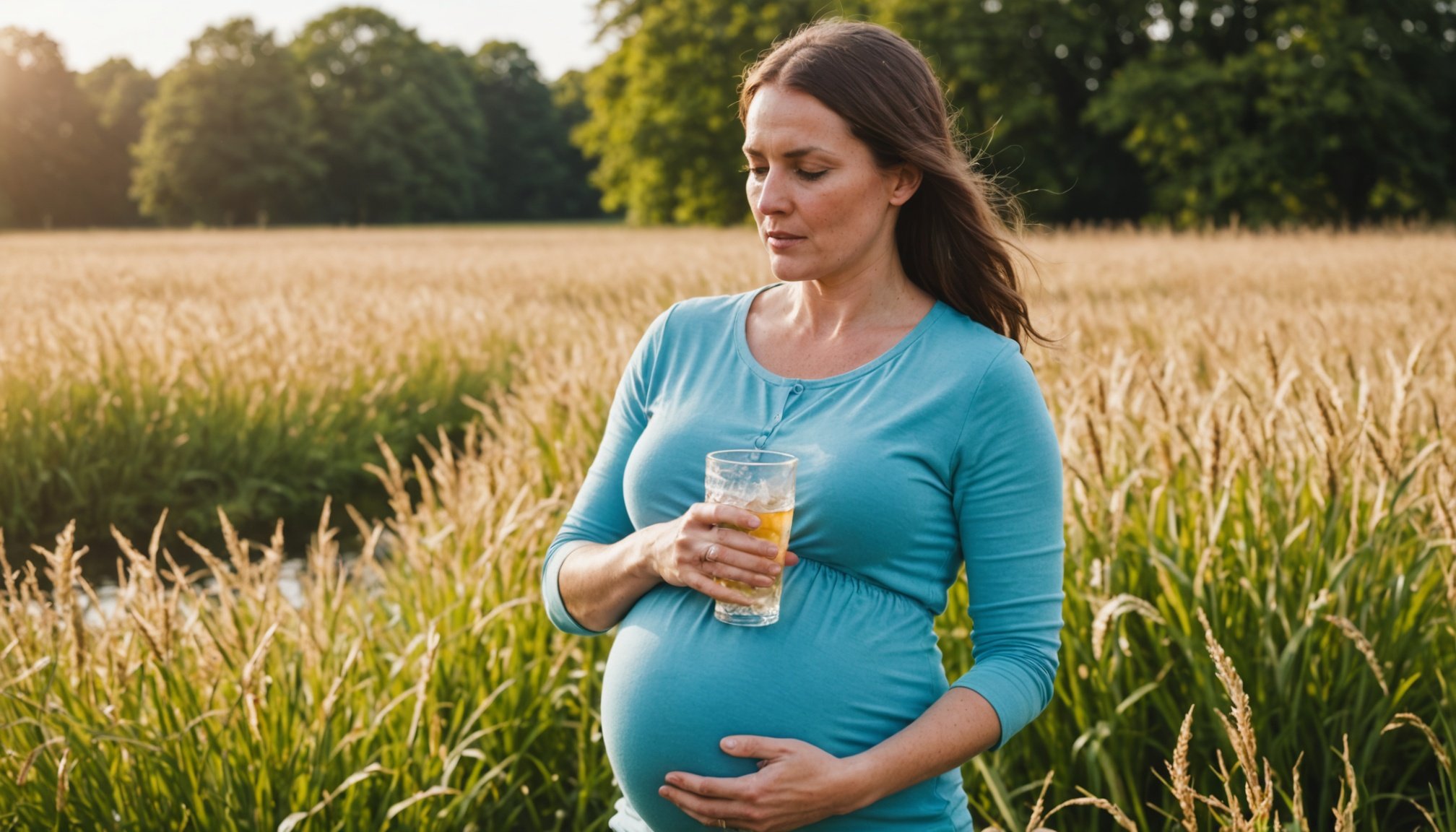Recognizing Dehydration During Pregnancy: A Comprehensive Guide for UK Women
Understanding Dehydration in Pregnancy
Dehydration, a condition where the body loses more fluids than it takes in, is a significant health concern for everyone, but it is particularly critical during pregnancy. Pregnant women have unique physiological changes that can make them more susceptible to dehydration. Here, we will delve into the key symptoms, causes, and prevention strategies for dehydration during pregnancy.
Physiological Changes in Pregnancy
During pregnancy, several physiological changes can affect a woman’s hydration status. For instance, blood volume increases significantly, which can lead to a higher demand for fluids. Additionally, the growing uterus can put pressure on the bladder, leading to more frequent urination and potentially increasing fluid loss.
Also to discover : Essential Tips for Pregnant Women Navigating Peak Hour Public Transport in the UK
Signs and Symptoms of Dehydration
Recognizing the signs of dehydration is crucial to prevent it from becoming severe. Here are some key symptoms to look out for:
Mild Dehydration Symptoms
- Thirst: One of the earliest signs of dehydration is feeling thirsty. However, in pregnant women, thirst can sometimes be masked by other symptoms like morning sickness.
- Urine Color: If your urine is medium to dark yellow, it may indicate that you are not drinking enough water. Clear or light yellow urine is a good sign of adequate hydration.
- Urination Frequency: Pregnant women who urinate less often than usual may be dehydrated.
- Dry Mouth and Lips: A dry or sticky mouth and dry lips can be indicative of dehydration.
- Fatigue and Dizziness: Feeling tired, less alert, dizzy, or weak are common symptoms of mild dehydration.
- Headache: Headaches can also be a sign that your body needs more fluids.
Severe Dehydration Symptoms
- Confusion and Drowsiness: In severe cases, dehydration can cause confusion, drowsiness, and a complete lack of urination or sweating.
- Weak or Fast Pulse: A weak or fast pulse and severe dizziness or fainting are red flags that require immediate medical attention.
Causes of Dehydration During Pregnancy
Several factors can contribute to dehydration in pregnant women:
Additional reading : Expert Tips from UK Doctors: How to Effectively Manage Heartburn During Pregnancy
Common Causes
- Morning Sickness: Nausea and vomiting, especially in the first trimester, can lead to significant fluid loss. Hyperemesis gravidarum, a severe form of morning sickness, can be particularly debilitating and requires medical attention.
- Increased Urination: The pressure from the growing uterus on the bladder can lead to more frequent urination, increasing fluid loss.
- Diet and Lifestyle: A diet low in hydrating foods like fruits and vegetables, or engaging in activities that involve heat such as hot yoga, can exacerbate dehydration.
- Medications and Health Conditions: Certain medications, such as diuretics, and health conditions like gestational diabetes can also contribute to dehydration.
Special Considerations for Pregnant Women
- Fasting and Special Diets: For women who observe fasting traditions like Karwa Chauth, it is crucial to stay hydrated by drinking plenty of fluids during the eating window and avoiding diuretic drinks like coffee or tea.
- Physical Activity: Engaging in regular physical activity is important for health, but it can increase fluid loss. Pregnant women should ensure they drink water before, during, and after exercise.
Preventing Dehydration
Preventing dehydration is easier than treating it, and here are some practical tips to help you stay hydrated:
Hydration Tips
- Drink Plenty of Water: Aim to drink at least 6 to 8 glasses of water per day, but listen to your body and drink when you feel thirsty. Plain water is the best choice, but other fluids like tea, coffee, and milk also count toward your fluid intake.
- Eat Hydrating Foods: Include foods with high water content in your diet, such as melons, cucumbers, berries, and lettuce.
- Monitor Urine Color: Check the color of your urine regularly. If it is dark yellow, it’s a sign that you need to drink more.
- Use Tracking Tools: Use apps or set reminders to track your water intake.
- Avoid Diuretic Drinks: Limit or avoid drinks like coffee and tea, especially if you are fasting or engaging in activities that increase fluid loss.
Managing Dehydration During Special Circumstances
Fasting During Pregnancy
For pregnant women who fast, such as during Karwa Chauth, it is essential to take extra precautions:
- Consult Your Doctor: Before deciding to fast, consult your doctor to assess any risks associated with fasting during your pregnancy.
- Stay Hydrated: Focus on drinking plenty of fluids during the eating window. Include hydrating foods like watermelon, oranges, and cucumbers in your meals.
- Avoid Diuretic Drinks: Avoid coffee, tea, and other diuretic drinks that can reduce your body’s water content.
- Take Rest: Avoid exhausting yourself, as fatigue and stress can exacerbate dehydration.
Impact of Dehydration on Health During Pregnancy
Dehydration can have several adverse effects on both the mother’s and the baby’s health.
Health Complications
- Constipation: Dehydration can lead to constipation, as water helps soften the stool. This can be particularly uncomfortable during pregnancy when constipation is already a common issue.
- Kidney Stones: Inadequate fluid intake is a key risk factor for kidney stones, which can be painful and require medical intervention.
- Lower Cognitive Function: Dehydration has been linked to lower cognitive function, which can affect daily activities and overall well-being.
- Mortality in Older Adults and Pregnancy Complications: While the link to mortality is more commonly discussed in older adults, severe dehydration in pregnant women can lead to complications such as preterm labor and low birth weight.
Practical Advice and Resources
Here are some practical tips and resources to help you stay hydrated during pregnancy:
Daily Hydration Plan
| Time of Day | Hydration Tip |
|---|---|
| Morning | Start your day with a full glass of water. |
| Before Meals | Drink water 30 minutes before meals to help with digestion. |
| During Exercise | Drink water before, during, and after physical activity. |
| Evening | Have a glass of water before bed to stay hydrated overnight. |
Quotes from Experts
- “During Karwa Chauth, married women tend to fast for the entire day even without drinking any fluid. This fast is itself considered difficult for women with healthy physical well-being. In this case, fasting while pregnant can pose several threats to them and the developing fetus,” says Dt Arti Singh, Consultant – Nutrition and Dietitian at Motherhood Hospitals in Kharghar, Mumbai.
Additional Resources
For more detailed advice, you can consult resources like the National Health Service (NHS) or speak with your healthcare provider. Here are some key points to discuss with your doctor:
- Monitoring Fetal Movements: Be mindful of your baby’s movements throughout the day and report any significant changes to your doctor.
- Managing Blood Sugar Levels: If you have gestational diabetes, your doctor can guide you on managing your blood sugar levels while staying hydrated.
- Balanced Diet: Ensure you are following a well-balanced pregnancy diet that includes plenty of hydrating foods and fluids.
Dehydration during pregnancy is a serious issue that can have significant health implications for both the mother and the baby. By understanding the signs and symptoms, being aware of the causes, and following practical hydration tips, pregnant women can ensure they stay well-hydrated throughout their pregnancy. Always consult your healthcare provider if you have any concerns or doubts about your hydration status or any other aspect of your pregnancy.
Key Takeaways
- Drink Plenty of Water: Aim for at least 6 to 8 glasses of water per day.
- Eat Hydrating Foods: Include foods with high water content in your diet.
- Monitor Urine Color: Check the color of your urine regularly.
- Avoid Diuretic Drinks: Limit or avoid drinks that can reduce your body’s water content.
- Consult Your Doctor: Especially if you are fasting or have any underlying health conditions.
By staying informed and proactive about hydration, you can ensure a healthier pregnancy and better overall health for you and your baby.











